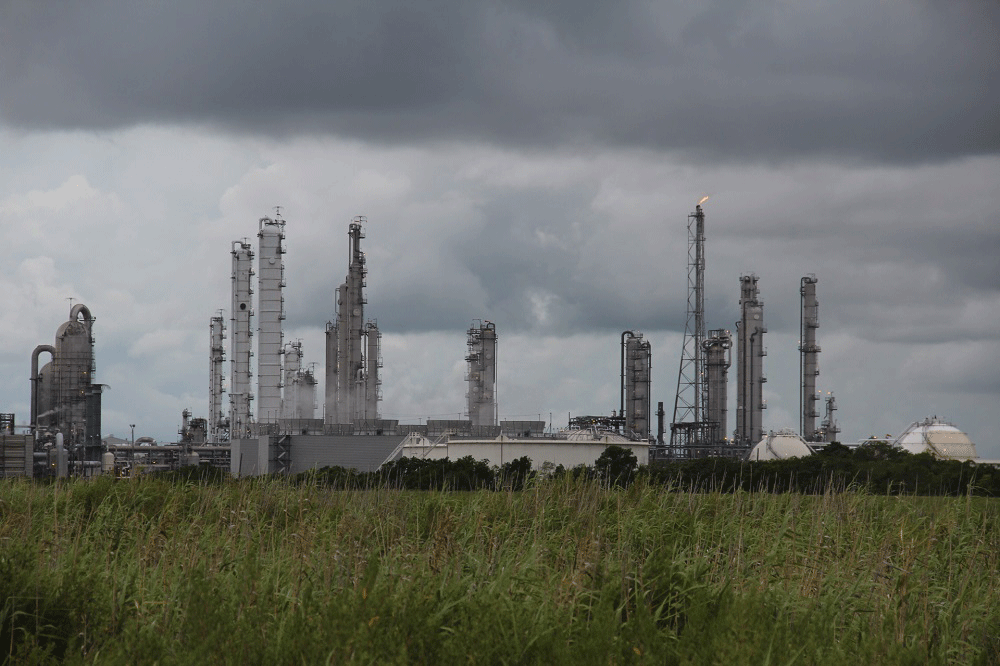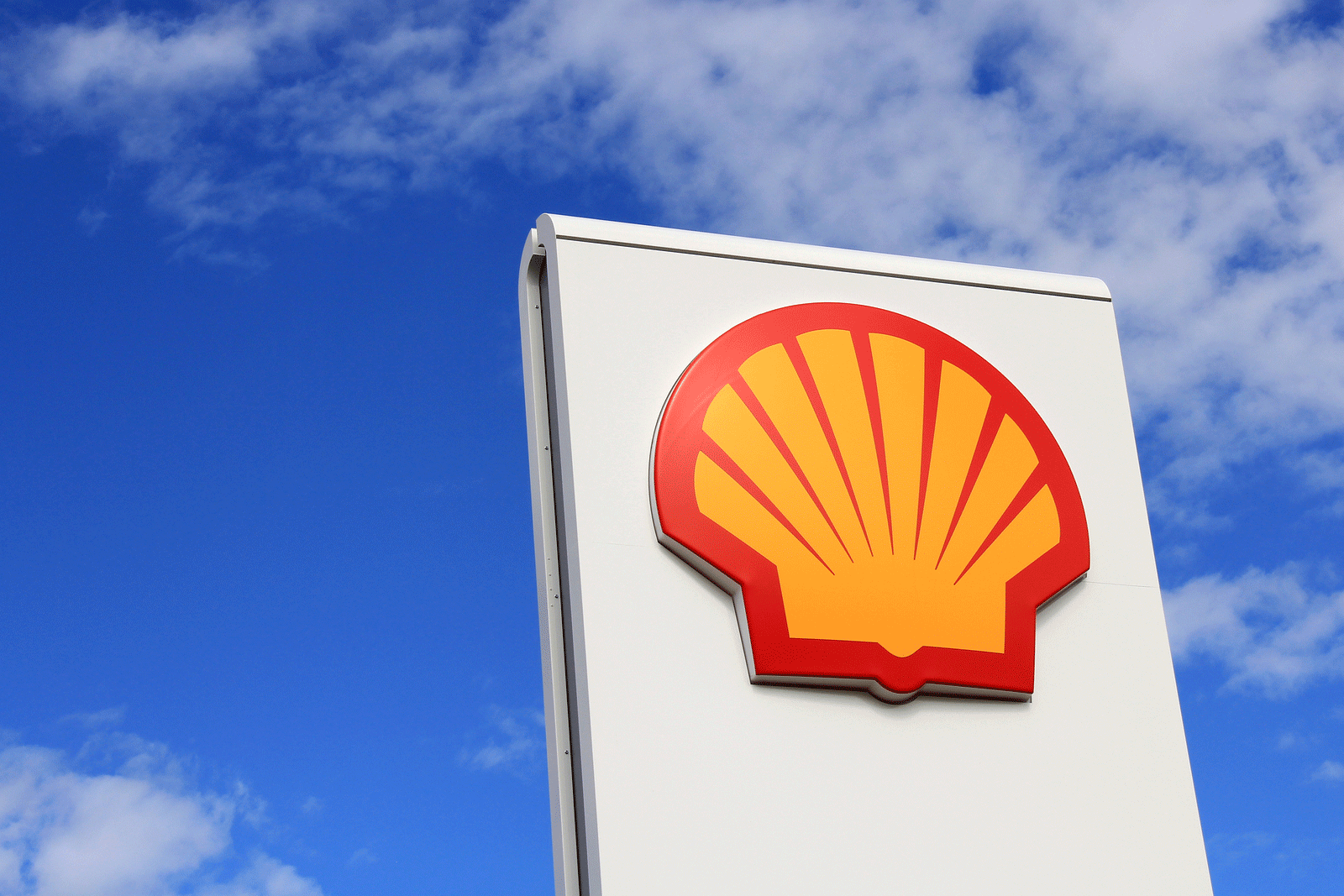Petrochemical Boom on the Gulf Coast
Air Date: Week of March 14, 2014

The BASF facility is part of an expansion in the petrochemical industry that promises $129 billion in new investments nationwide as a direct result of shale gas. (Photo: Reid R. Frazier)
Booming shale gas production has helped fuel a petrochemical boom. Reid Frazier of the Allegheny Front’s went to Port Arthur, Texas, to explore the economic benefits and the health concerns that result from this industry.
Transcript
CURWOOD: It's Living on Earth, I'm Steve Curwood. Fossil fuel is the lifeblood of modern transportation, and the source of those miraculous flexible, versatile, products - plastics. The natural gas boom is fueling a $100 billion dollar industrial resurgence in the petrochemical industrial complex on the Gulf Coast, and there are plants on the drawing boards elsewhere, including the Marcellus shale region of Pennsylvania. Reid Frazier of the public radio program the Allegheny Front reports from Port Arthur, Texas.
[FURNACE BURNING]
FRAZIER: Standing beneath what looks like an enormous HVAC system, Andy Miller points to a large metal box above him. A furnace burns at 2,000 degrees Fahrenheit inside the box.
MILLER: If you look up into this peep hole, you’ll be able to see some of the firing that goes on within a furnace.
FRAZIER: I look up into a hole the size of a quarter. There’s an orange glow coming from inside.
MILLER: But as you can see, this is where we actually crack the material into the products we desire.
FRAZIER: Miller is a unit manager for BASF at the company’s plant in Port Arthur, Texas. The plant here makes ethylene – this is like the granddaddy of all plastic, and many chemicals as well. You know that milk jug you’ve got in your fridge? Or the antifreeze in your car? All of it started its life in a place like this.
MILLER: This is where we start to build the building blocks to make those products.
FRAZIER: The plant was built 15 years ago to process crude oil into ethylene. But it recently underwent a facelift. It added some new equipment. Plant manager Greg Masica points me to some of it.
MASICA: What you see over here with this whole unit is a vaporizer.
FRAZIER: The vaporizer takes ethane - a key component of natural gas, and readies it for processing. The cracker heats the ethane up so hot that it cracks – literally. The molecular bonds holding it together, that have actually held it together for eons, break apart and form into ethylene.
When the plant was built, oil was the preferred raw material for the plant - natural gas was too expensive. But that changed a couple of years ago, thanks to a drilling boom brought on by fracking. Once $12 per thousand cubic feet, the price of natural gas has dropped and it’s now between $3 and $4.
As a result, chemical plants around the Gulf are expanding, or like BASF switching to natural gas. Shell’s proposed ethane cracker in Beaver County, in Western Pennsylvania, is one of seven brand new ethane crackers planned for the United States. That plant would take ethane from the Marcellus shale and convert it to ethylene. And other plastic units could be built alongside it. Industry experts all agree - fracking is good news for the American chemical industry.
CHANG: It is a huge deal. It’s a great amount of expansion, all based on the premise that you’re going to have these low-cost natural gas feedstocks for some time.
FRAZIER: Joe Chang is global editor of ICIS Chemical Business, a trade publication. Chang estimates the industry will expand in the U.S. by a whopping 38 percent in the next decade.
CHANG: It really has changed everything for the U.S. chemical sector and increased their prospects on a global basis.
FRAZIER: Almost overnight, America has become one of the cheapest places in the world to make plastic. That has the petrochemical industry here giddy. It’s planned over $100 billion in investments and is predicting a big jobs impact. But few of these jobs will actually occur at the plants themselves. After all, a new plant has a lot of automation, and only needs a few hundred workers to run it. But there are lots of other jobs that are created outside of the plant itself.
[SOUNDS OF GARAGE]
A few miles from the BASF plant, workers at DeBusk Services Group take a break between service calls. Randall Delahoussaye is the safety director here. He said the Port Arthur region suffered after the BP oil spill cooled off drilling in the Gulf. But drilling’s coming back, and expanding petrochemical plants have kept his shop and the local economy humming.
DELAHOUSSAYE: There’s a whole lot more motels in the area, the businesses stay packed, so the area around here’s been booming pretty good.
FRAZIER: His company uses industrial pressure washers to clean out pipes at big chemical plants and refineries. More plants, and more units mean more work for his crew of 50 or so.
DELAHOUSSAYE: As they put in more exchangers, more towers, it’s just more things to break. To go in and clean.
FRAZIER: The expansion of chemical plants in the Gulf is good news for the economy. But it’s happening in a region where the industry has had a mixed environmental record. Port Arthur is an oil town, and the city is ringed with a dozen industrial plants and refineries. The city used to fall short of federal air quality standards. But it’s met those standards the past eight years, because companies have cut down their emissions, and new plants have to demonstrate they’ll use tighter pollution controls before they’re allowed to build.
But the plants in Port Arthur still release nearly four million pounds of hazardous chemicals into the air every year, according to the EPA. That has some who live near the plants worried the air is bad for them. Jason Warrior is 28. He lives in Carver Terrace, a public housing project in the city’s predominantly black west side.
WARRIOR: This is an asthma pump my daughter right here uses.
FRAZIER: What’s your name sweetheart?
DAUGHTER: Makayla.

Jason Warrior and his 6-year-old daughter, Makayla both suffered from asthma since moving to Carver Terrace. (Photo: Reid R. Frazier)
FRAZIER: Makayla, who is six, uses the pump twice a week.
The neighborhood is near several chemical plants and the biggest refinery in the country. The EPA says the air quality here is good, but a door-to-door survey, conducted by a local community group a few years ago found that one in four households here has a child with asthma.
Warrior moved here three years ago to look for work in one of the plants, but hasn’t been able to find any so far. Both he and six-year-old Makayla got asthma when they moved here. These apartments are slated to be torn down. Some have mold inside, which can also exacerbate breathing problems. Warrior doesn’t know what’s caused his asthma, but he thinks the dark smoke he sometimes sees coming out of the plants may have something to do with it.
The smoke comes during unplanned events - like a power outage - when a unit is forced to burn off chemicals and fuel for safety reasons. According to state records, smaller events can happen on a nearly weekly basis here, according to state records. Sometimes, Warrior says, the flares at the plants light up the streets in the middle of the night.
WARRIOR: Probably like 2, 3 in the morning - something like that? They start burning them off. You’ll see the whole apartment building around here just light up.

Royal Dutch Shell Company plans to build the first petrochemical plant in Appalachia. It would be located in Monaca, Beaver Country, PA. (Photo: Bigstock Photo)
FRAZIER: It’s a sight that means jobs, and work for many in this community. With new plants in the works, it’s a sight that many along the Gulf - and possibly in Pennsylvania - will be seeing more of in the future.
CURWOOD: Reid's story comes to us courtesy of the public radio program the Allegheny Front; with support from the Fund for Investigative Journalism.
Links
Living on Earth wants to hear from you!
Living on Earth
62 Calef Highway, Suite 212
Lee, NH 03861
Telephone: 617-287-4121
E-mail: comments@loe.org
Newsletter [Click here]
Donate to Living on Earth!
Living on Earth is an independent media program and relies entirely on contributions from listeners and institutions supporting public service. Please donate now to preserve an independent environmental voice.
NewsletterLiving on Earth offers a weekly delivery of the show's rundown to your mailbox. Sign up for our newsletter today!
 Sailors For The Sea: Be the change you want to sea.
Sailors For The Sea: Be the change you want to sea.
 The Grantham Foundation for the Protection of the Environment: Committed to protecting and improving the health of the global environment.
The Grantham Foundation for the Protection of the Environment: Committed to protecting and improving the health of the global environment.
 Contribute to Living on Earth and receive, as our gift to you, an archival print of one of Mark Seth Lender's extraordinary wildlife photographs. Follow the link to see Mark's current collection of photographs.
Contribute to Living on Earth and receive, as our gift to you, an archival print of one of Mark Seth Lender's extraordinary wildlife photographs. Follow the link to see Mark's current collection of photographs.
 Buy a signed copy of Mark Seth Lender's book Smeagull the Seagull & support Living on Earth
Buy a signed copy of Mark Seth Lender's book Smeagull the Seagull & support Living on Earth

